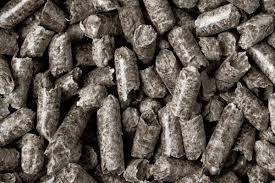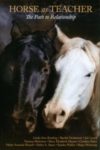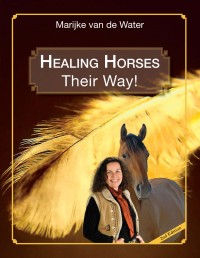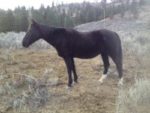Posts Tagged ‘rivas remedies’
Feed Cranberries to Horses
Editor’s Note: This article has been sourced via Riva’s Remedies.
I’m always looking for new foods that horses might like to provide them with variety and extra nutrition. Turns out that raw organic cranberries are the new face around here – they gobble them right up even with the tart taste. Cranberries are rich in Manganese, Vitamin C, Vitamin E, fibre, and anti-oxidants. They are a natural anti-inflammatory and antibiotic, and are beneficial for the immune system and heart. Just add 1/4 cup to their breakfast.
Hormonal Mares
Editor’s Note: This article has been sourced via Riva’s Remedies.
Many mares exhibit hormonal problems through mood and behaviour changes. This is often seen during a mare’s cycling days, however many mare owners report problems with their behaviour on a daily basis even when they are not cycling. Unfortunately, too many times we have simply attributed this to “mares being mares”, and have not recognized that these girls are not feeling well and that they can suffer from the same anxiety, irritability, aggression, sadness and depression as women do during PMS or an unhealthy menopause. They can also have problems with cycling pains. Pain and/or emotional symptoms make it very hard for mares to tolerate being handled or ridden, to compete and/or to cooperate with other horses. Unfortunately these behaviours often get dismissed as a personality or training problem.
Hormones are powerful chemicals that have a profound effect on the neurotransmitters of the brain: estrogen has an excitatory effect on the brain, increasing serotonin and acetylcholine levels whereas progesterone has a more calming effect. Serotonin is responsible for creating positive moods and acetylcholine is necessary for focus and memory.
As with humans, diet can be an important factor – high-sugar feed such as oats or sweet feed will exacerbate hormonal symptoms. Horse owners also report that high quantities of alfalfa can negatively affect behaviour as well. (For humans, caffeine and dairy products are the most common dietary culprits that contribute to PMS and menopausal symptoms.)
Fortunately, when hormonal mares are supplemented with the appropriate nutrients and/or hormone-balancing herbal blends they will quickly improve to experience an increase in stable moods and suffer less depression, less aggression and more motivation. Beneficial nutritional supplements include the Riva’s Vitamin B6 (pyridoxine) and Riva’s Primrose Oil. Vitamin B6 is essential for the synthesis of both hormones and neurotransmitters and has the added benefit of regulating blood sugar levels. Vitamin B6 will also support pituitary and thyroid function as these endocrine glands rely on this vitamin for optimum health. Riva’s Primrose Oil provides essential fatty acids and 9% gamma-linolenic acid (GLA) which is found in the plant seeds of evening primrose oil. Primrose oil also has anti-inflammatory properties which helps with skin conditions and arthritis.
Herbal blends for hormone balance are also available as they re-balance the estrogen and progesterone levels and calm the emotions. The Riva’s Herbal Blend for Mares contains black cohosh, blessed thistle, chamomile and wild yam root to tone the ovaries and sooth the nerves. This blend will also effectively regulate erratic cycles, ease uterine cramping and/or help to increase fertility – although it is not advisable to feed it during pregnancy. This blend has an effective stabilizing effect on moods.
If the thyroid or pituitary glands are needing support in addition to the reproductive hormones then add the Riva’s Hormone Boost which contains Ashwaghanda, Chaste Berry, Kelp, Licorice Root and Raspberry Leaf. This formula will strengthen the endocrine gland system, relieve stress and balance hormone levels. It is also beneficial in cases of Equine Metabolic Syndrome, Insulin Resistance and Cushing’s since it supports the pituitary and adrenal glands and helps to regulate insulin levels and metabolism.
If the hormones are stabilized but your mare still appears uncooperative with an attitude then she either has other underlying emotional issues (she needs to be heard) or the training program should be assessed. Some “mare behaviour” has been allowed to become a pattern, in which case competent but compassionate handling will help them establish new patterns. And don’t put food down in front of “cranky” mares until their ears come forward – this might take time at first but they should learn to “smile” in the presence of food.
With good food, supplements and common-sense handling your mare will be a happy, healthy and willing partner.
“Riva’s Healing Spirit awakens the essence that resides within each one of us
– animal or human – the heart of which connects
and aligns us with the greater spirit that heals all.”Marijke van de Water, B.Sc., DHMS
Equine Health & Nutrition Specialist
Homeopathic Practitioner
Medical Intuitive & Healer
Author & Educator
For more information on your horses’ diet,
nutrition and health conditions read
“Healing Horses Their Way”
Watch the Riva’s Remedies video on YouTube “Hormonal Mares and Geldings”
What’s TRUE about beet pulp

Editor’s Note: This article has been sourced via Riva’s Remedies.
Beet pulp is the fibrous material left over after the sugar is extracted from sugar beets. It’s an excellent source of crude fibre (18%) and contains both insoluble and soluble fibre which is mostly pectin. Pectin is a highly digestible fibre which is why beet pulp is such a good energy source – horses obtain over 75% of their energy from the fermentation of fibre; not from protein, carbohydrates or oil. Beet pulp fibre is also an effective prebiotic that helps the equine hind-gut synthesize natural levels of probiotics which, in turn, helps to maintain the intestinal ecosystem including the immune system. Fibre is a natural detoxifier of the intestines and the liver and beet pulp is also high in calcium.
Beet pulp has a very low glycemic index meaning that it doesn’t cause a blood sugar spike as do grains such as oats, corn or barley. In addition, it will actually help stabilize blood sugar levels due to its high fibre content. And even though most manufacturers add 5-10% molasses to the pellets the glycemic index is still within acceptable levels because the high fibre content slows down any sugar absorption. Therefore, beet pulp of any kind is frequently a suitable feed for metabolic and/or insulin resistant horses or other sugar-sensitive horses.
Unfortunately, there are many misconceptions about beet pulp that are not based on fact. Here is what is TRUE about beet pulp.
- Beet pulp is not high in sugar. It is high in fibre.
- Beets are not treated with chemicals to kill the top leaves – they are mechanically removed.
- The pulp is produced by soaking beets in hot water, not harsh chemicals.
- Beet pulp is not a source of toxic iron; iron is not a toxic mineral, it is vital to good health and many horses are deficient in iron.
- Beet pulp does not contain higher levels of aluminum than table salt and/or oats for example.
- Pesticide levels in beet sugar is zero and the levels in pulp are extremely low.
For many horses, the available energy, the digestible fibre and its activity as a prebiotic makes beet pulp a beneficial feed that over-rides any negative aspects. At this time there is no other healthier substitute which has the same benefits. However, beet pulp is a GMO crop so let your growers know that organic is your choice for all foods. If everyone bought organic food for themselves and for their animals the world would be cleaner, happier, healthier and, most importantly, more humane.
Some horses don’t tolerate beet pulp however so eliminate it from the feed program if there are any signs of indigestion or other symptoms. Always avoid high sugar feeds, commercial feeds, feeds with unknown ingredients, fats/oils and any other high fat foods.
Beet pulp should always be fed soaked. It can absorb four times its dry weight in water making it a good source of water as well. It is not necessary to rinse or wash beet pulp before soaking.
Need an answering service for your business? Try a virtual receptionist by Virtual Assistant Canada.
April is Homeopathy Month!
I received this reminder from Riva’s Remedies – a great resource for healing your horse.
Marijke van de Water (B.Sc., DHMS) is an Equine Health & Nutrition Specialist, Homeopathic Practitioner, Medical Intuitive & Healer and naturally…a teacher and author! Many thanks to her for spreading her great work and guidance.
=========================================================
Homeopathy to the Rescue
Homeopathy is a natural system of medicine dating back 200 years ago. While North America is slowly accepting homeopathy as an established form of medicine it is a widely accepted modality in Europe, UK, India and Latin America. Homeopathic remedies are highly diluted doses of substances to stimulate the body’s own healing mechanism to promote health.The use of homeopathic medicines – popularly known as remedies – is based on the discovery that natural substances are capable of curing the same symptoms that they can cause – “The Law of Similars”.
For example, homeopathic (or diluted) onion treats eye and nose allergies, homeopathic ipecac treats nausea and vomiting and homeopathic influenza virus treats cold and flu symptoms.
Riva’s Remedies homeopathics are formulated as easy-to-use combination remedies to address common situations.
Visit Riva’s Remedies for more information.
From Riva’s Remedies: Holly’s Story
Sharing a story from Marijke van de Water of Riva’s Remedies…
Holly’s Laminitis
Holly is a 6 year old Arab mare from B.C., Canada who was afflicted with severe laminitis in all four hooves in May 2012; she was unable to walk or even stand some days and spent days laying with ice packs on all four feet. By June of the same year both Holly’s progress and prognosis were poor. Thus Holly’s owner Diane Armitage contacted Marijke for help in healing Holly’s very sore hoof condition. This case was of interest to Marijke because while the majority of cases of laminitis are caused by feed imbalances, leaky gut, Equine Metabolic Syndrome, lack of movement and/or poor hoof trims, Holly’s case was more complex and her laminitis was multi-factorial.
In addition, other than a two week overdue trim, Holly’s hoof angles and hoof mechanism were acceptable. Because Holly and Diane live several
hours from the Riva’s Remedies health clinic, I conducted Holly’s health assessment by distance using The Marijke Method™, a specific method of kinesiology to identify underlying health issues and to formulate successful health programs. I found that Holly had three issues directly relating to her laminitis:…
Marijke works from her naturalhealth clinic in Armstrong, B.C. where she specializes in helping horses and people. She holds a B.Sc. in Clinical Nutrition and a Diploma in Homeopathic Medicine and Science. She blends her vast knowledge of science, health and nutrition with natural medicine, kinesiology and energy healing. She is considered one of the foremost experts in therapeutic nutrition and equine natural medicine with a special interest in digestive disorders, immunity, laminitis, metabolic syndrome, and emotional and spiritual wellness.
Marijke is also the founder, formulator and CEO of Riva’s Remedies, a herbal and homeopathic product line for horses.
Healing Laminitis & Metabolic Syndrome with Nutrition: Part 1
By Marijke van de Water, B.Sc., DHMS
A complex condition and number two cause of death in horses laminitis is related to the over-feeding of grass and grain and is actually a metabolic disease that affects the laminellar tissue, specialized tissue that ensures the structural integrity of the hoof by adhering the coffin bone to the inner hoof wall. Because of the highly vascular nature of the horse’s hoof it is extremely susceptible to inflammation and damage especially from digestive toxicity resulting from the over-feeding of starches and sugars.





